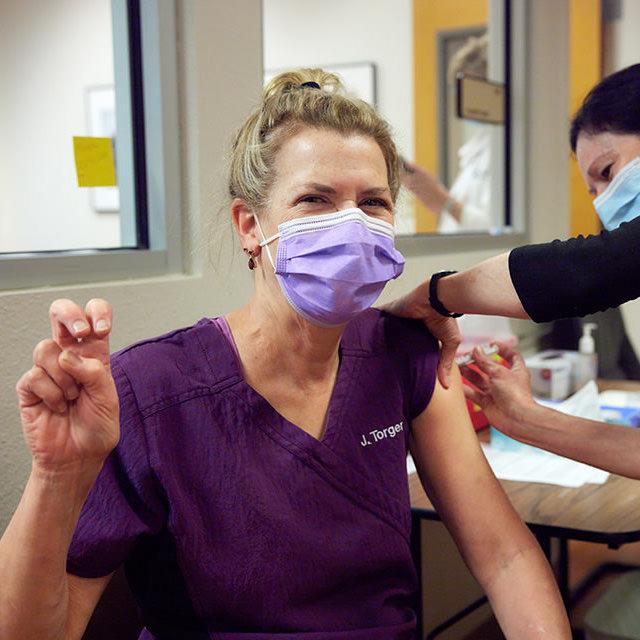Vaccines have been available free on campus since late 2020, but some individuals remain hesitant. We asked Dr. Jane Torgerson, medical director of the Brown-Lupton Health Center, to respond to common concerns she encounters about the COVID-19 vaccine.
Myth 1: The COVID-19 vaccine alters DNA.
Dr. Torgerson: COVID-19 vaccines do not impact or even interact with our DNA. There are three vaccines authorized for use in the United States. Pfizer-BioNTech and Moderna are messenger RNA vaccines, and Johnson & Johnson/Janssen is a viral vector vaccine. Both mRNA and viral vector COVID-19 vaccines deliver genetic material to our cells that instructs them to start building protection against the virus that causes COVID-19. That material does not enter the nucleus of our cells, which is where our DNA is kept.
Myth 2: The COVID-19 vaccine impacts fertility.
Dr. Torgerson: There is no evidence to suggest any vaccines — including COVID-19 vaccines — affect current or future fertility in women or men. The vaccine uses a spike protein and was rumored to be the same spike protein that is involved in the growth and attachment of the placenta during pregnancy, but this is false. The two spike proteins are simply not the same. Furthermore, vaccine testing revealed no impact on pregnancy. It is simple: getting a vaccine is a way you can protect yourself from severe illness, which positively impacts our health and fertility overall.
Myth 3: The COVID-19 vaccine gives you COVID.
Dr. Torgerson: None of the three vaccines authorized for use in the U.S. contains the live virus that causes COVID-19; therefore, they cannot infect you with COVID. These vaccines teach our immune systems how to recognize and fight the virus that causes COVID-19. Some people develop mild symptoms after receiving the vaccine — such as fever, headache or fatigue — but these short-lived side effects are normal and are actually a sign that your body is building protection against the virus that causes COVID-19.
Myth 4: The COVID-19 vaccine is ineffective.
Dr. Torgerson: In clinical trials, all three COVID-19 vaccines — Pfizer-BioNTech, Moderna and Johnson & Johnson/Janssen — were effective in protecting people against COVID-19, including severe illness. Vaccine effectiveness studies — which evaluate how COVID-19 vaccines are working in real-world conditions — also show that the vaccines are working well. There are more data available on the effectiveness of the mRNA vaccines (Pfizer-BioNTech and Moderna) since they have been in use longer, and those studies show an effectiveness rate of 90% or more in people who are fully vaccinated. Data also suggest that vaccination may reduce the severity of symptoms in people who are vaccinated but still get COVID-19, something we sometimes refer to as “vaccine breakthrough cases.”
Myth 5: The COVID-19 vaccine is experimental technology.
Dr. Torgerson: Pfizer-BioNTech and Moderna are both mRNA vaccines. While that type of vaccine is new, the research and development behind it has been going on for decades. Many traditional vaccines — like for the flu — put a weakened or inactivated germ into our bodies to trigger an immune response that produces antibodies, which are the proteins that help protect us if the real virus enters our bodies. In contrast, mRNA vaccines deliver genetic material that teaches our cells how to make a protein that triggers the immune response that produces antibodies that protect us from getting sick if the real virus enters our bodies. Interest and research in mRNA vaccines has been growing because they can be developed in a laboratory using readily available materials — enabling vaccines to be developed much faster than through traditional methods. Furthermore, cancer researchers have been working with mRNA to trigger the immune system to target specific cancer cells. On the other hand, Johnson & Johnson/Janssen is a viral vector vaccine that uses a harmless virus to deliver the instructors that tell our cells how to build protection against COVID-19. Scientists began creating viral vectors in the 1970s and have used them to treat cancer and for molecular biology research.
Read more about the COVID-19 vaccine from the Centers for Disease Control and Prevention website [link removed]. Find out where to get your vaccine on the Protect the Purple site [link removed].
Already vaccinated? Verify your vaccine with TCU. Should you be exposed to someone with COVID-19, per CDC guidelines [link removed] you will not be required to quarantine as long as you remain symptom-free. Knowing how many of our campus members are vaccinated also helps TCU inform its public health guidance.
